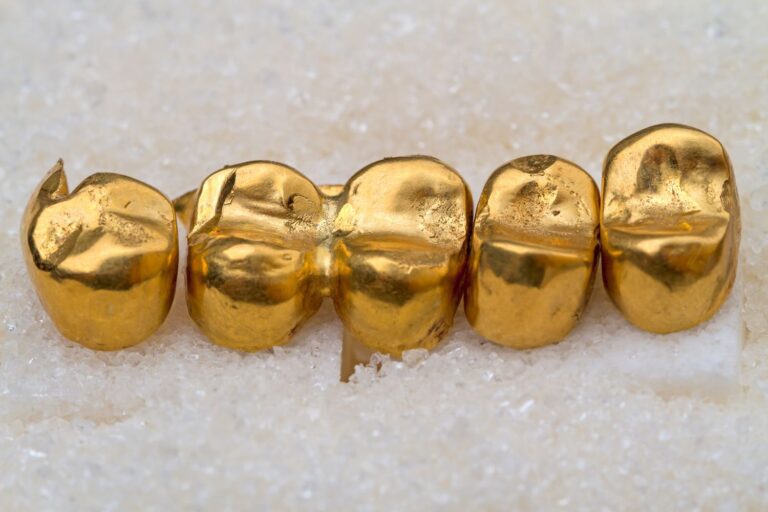Dental crowns are used for a variety of reasons. Your dentist may recommend one due to loss of tooth structure or root canal treatment. You can also choose one to cosmetically improve your smile.
There are many different types of crowns used to restore a tooth. Among them are gold crowns, which have been used in dentistry for many years.
Materials
In dentistry, there are three main categories of crowns, all metal crowns, all porcelain crowns and porcelain fused to metal (PFM).
Gold crowns are a type of metal crowns. There is the option of a full gold crown made entirely of gold or a gold alloy. A gold crown can also be a PFM, which is made from a combination of gold and porcelain.
Three types of alloy are used to make gold rings:
- High noble alloy (precious metal): Made of at least 60% high noble alloy. This includes gold, platinum and palladium. If a crown uses a combination of these alloys, at least 40% must be gold.
- Noble alloy (semi-precious metal): A noble alloy consists of 25% precious metal.
- Non-noble alloy (non-precious metal): Made of less than 25% precious metals.
Benefits
There are many reasons why your dentist may recommend a gold crown. For example, gold crowns are able to withstand heavy forces from chewing and may be recommended if you experience heavy wear patterns on your teeth.
Additionally, these crowns are less prone to chipping or breaking, making them a long-lasting dental restoration. If a tooth with a gold crown breaks, it is generally because the underlying structure of the tooth is broken or damaged. However, gold crowns can loosen, especially if you eat foods and candies that are harmful to crowns and bridges.
Gold crowns also cause less wear on the opposite tooth. For patients who grind their teeth or have a heavy bite, a gold crown will usually cause the same amount of wear and tear on the teeth, compared to natural tooth enamel.
Since they are yellow or white gold in color, gold crowns are mainly used to restore molars and premolars. Some people request gold crowns on their front teeth as well. This choice is often more of a fashion statement popularized by well-known rappers.
Allergies
If you have a metal allergy, such as a nickel allergy, be sure to tell your dentist before a gold crown is made. A high noble alloy that does not contain nickel or other common metals that cause allergic reactions should be used carefully in these cases.
Cost
Many dentists have a certain base price for all the crowns they offer their patients. However, because gold is very expensive, a gold crown can cost more than a porcelain crown. The increased cost is generally reflected in the lab charge, not your dentist’s fee.
A word from Verywell
Gold crowns are a great option for patients who are not necessarily interested in having a completely white smile. Gold crowns are, in fact, an attractive restoration and offer a long lifespan. If you need a crown, talk to your dentist about the different crown options available.


